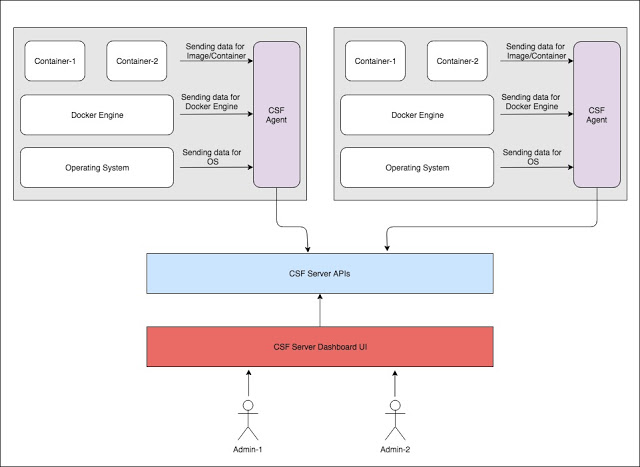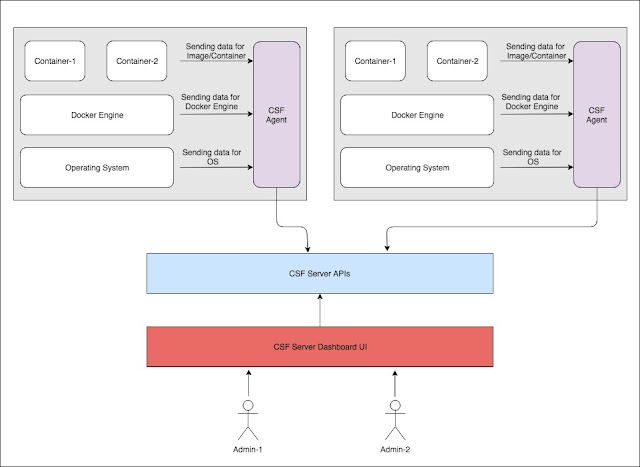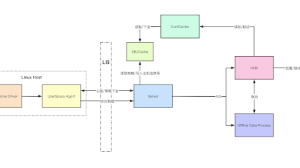[sc name=”ad_1″]
ArmourBird CSF – Container Security Framework is an extensible, modular, API-first framework build for regular security monitoring of docker installations and containers against CIS and other custom security checks.
ArmourBird CSF has a client-server architecture and is thus divided into two components:
a) CSF Client
- This component is responsible for monitoring the docker installations, containers, and images on target machines
- In the initial release, it will be checking against Docker CIS benchmark
- The checks in the CSF client will be configurable and thus will be expanded in future releases and updates
- It has been build on top of Docker bench for security
b) CSF Server
- This will be the receiver agent for the security logs generated by the various distributed CSF clients (installed on multiple physical/virtual machines)
- This will also have a UI sub-component for unified management and dashboard-ing of the various vulnerabilities/issues logged by the CSF Clients
- This server will also expose APIs that can be used for integrating with other systems
Architecture Diagram
APIs CSF Server
Issue APIs
POST /issues
- For reporting issues from CSF clients
GET /issues/{issueId}
- For listing specific issue with {id}
GET /issues
- For listing all issues reported by all CSF clients
PUT /issues/{issueId}
- For updating a specific issue (like for severity, comments, etc.)
DELETE /issues/{issueId}
- For deleting specific issue
Client APIs
POST /clients
- For adding a CSF client
GET /clients/{clientId}
- For listing specific CSF client
GET /clients/
- For listing all the CSF clients
PUT /clients/{clientId}
- For updating the CSF client (for e.g. IP addr, etc.)
DELETE /clients/{clientId}
- For deleting a CSF client from the network
Client Group APIs
POST /clientGroup
- Adding client to a specific group (for e.g. product1, HRNetwork, product2, etc.)
GET /clientGroup/{groupID}
- For listing client group details
GET /clientGroup/
- For listing all client groups
PUT /clientGroup/{groupID}
- For updating client group
DELETE /clientGroup/{groupId}
- For deleting client group
Installation/Usage
CSF client run as a docker container on the compute instances running docker installation. It can be executed using the following command using the docker image hosted on hub.docker.com:
docker run -it --net host --pid host --userns host --cap-add audit_control
-e DOCKER_CONTENT_TRUST=$DOCKER_CONTENT_TRUST
-e CSF_CDN='<TO-UPDATE>'
-v /etc:/etc
-v /usr/bin/docker-containerd:/usr/bin/docker-containerd
-v /usr/bin/docker-runc:/usr/bin/docker-runc
-v /usr/lib/systemd:/usr/lib/systemd
-v /var/lib:/var/lib
-v /var/run/docker.sock:/var/run/docker.sock
--label csf_client
-d armourbird/csf_clientMake sure to update CSF_CDN environment variable in the above command with the CSF server URL. Once the container is executed, it will start sending issue logs to the CSF server on constant intervals.
CSF server can run as a docker container or natively on a web server on which various CSF clients will be sending data. You can run it on your server using the following command using the docker image hosted on hub.docker.com
docker run -p 80:8000 -d armourbird/csf_serverBrowse the CSF server via the following links
- Dashboard: http://< your-domain >/dashboard/
- APIs: http://< your-domain >/api/
Building Docker Images
Building docker image for CSF Client
git clone [email protected]:armourbird/csf.git
cd csf_client
docker build . -t csf_clientBuilding docker image for CSF Server
git clone [email protected]:armourbird/csf.git
cd csf_server
docker build . -t csf_serverSneak Peak
Dashboard
API View
Website
https://www.armourbird.com/
Twitter
http://twitter.com/ArmourBird
References
https://www.cisecurity.org/cis-benchmarks https://github.com/docker/docker-bench-security
[sc name=”ad-in-article”]
























Add Comment